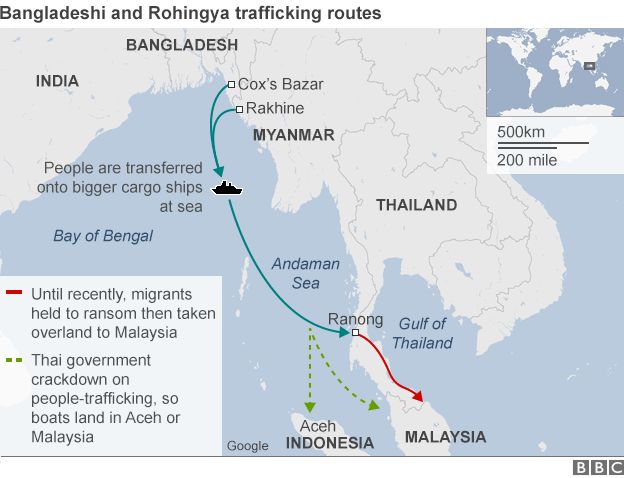
The police forensic team is carrying out identification process on the bodies following the discovery of mass graves believed to have been used to accommodate refugees in Padang Besar.
Home Minister Datuk Seri Dr Ahmad Zahid Hamidi in a press conference at the Parliament said the team was responsible to carry out forensics tests on the exhumed bodies in determining whether they were Rohingya or Bangladeshis.
"This is the same team that was dispatched to Ukraine to identify remains of the flight MH17 victims. I would like to also thank the Inspector-General of Police (Tan Sri Abdul Khalid Abu Bakar) and his deputy (Datuk Seri Noor Rashid Ibrahim) who visited the locations identified by the VAT 69 Commando Unit and the General Operations Force (GOF) there.
"We are also cooperating with the Thai government if any individuals (suspected to be involved in human trafficking) have escaped over to Thailand. The cooperation is not only on legal matters but also extended to humanitarian efforts," he said.

Zahid added that the Penang state government should extend assistance in preparing facilities to house the Rohingya. "We should focus on extending any form of assistance on humanitarian grounds rather than politicising the matter."
Zahid was responding to news reports that the state government wanted Rohingya and Bangladeshi migrants to be placed on federal government-owned lands citing space constraints. Zahid had earlier told the house all the police personnel were trained to carry out policing duties including the monitoring of the social media that was being used as platform of recruitment by the militant groups.
He was responding to a question by Dr Ko Chung Sen (DAP, Kampar) who asked for the allocated number of police personnel and funds to address the Islamic State (IS) and terrorism; and whether the 126,000 policemen are being assigned to monitor the social media to track potential terrorists.
Penang Chief Minister Lim Guan Eng in a separate Press conference reiterated the lack of land to house the refugees. "We are not saying that we refuse to help the Rohingya, but we are facing land constraints to build the facilities," said Lim.
Malaysia confirms discovery of 23 trafficking camps, 139 grave sites believed to contain migrants
Malaysia's police chief has confirmed the discovery of 139 grave sites and 28 human-trafficking camps in the country's remote northern border region.
National police chief Khalid Abu Bakar revealed the findings at a press conference a day after the government announced on Sunday the discovery of camps and graves, the first such sites found in Malaysia since a regional human-trafficking crisis erupted earlier this month.
"[Authorities] found 139 suspected graves. They are not sure how many bodies are inside each grave," General Khalid said.
He added that the number and size of the 28 camps found suggested they might have housed a combined hundreds of people.
The largest could hold up to 300 people, another had a capacity of 100, while the rest could hold about 20 each, he said.
The first decomposed body was brought down to a police camp set up at the foot of the mountains where the graves were discovered on Monday evening.
The operation took nearly five hours due to the rough terrain.
"The body was only bones and little bit of clothing on it," Padang Besar police officer-in-charge Rizani Che Ismail said.
He said the cause of death was not immediately apparent.
The discovery was the latest evidence of the lethal nature of the region's human-trafficking trade and has been condemned by Malaysia's prime minister Najib Razak.
"I am deeply concerned with graves found on Malaysian soil purportedly connected to people smuggling," Mr Najib said on his Facebook page.
"We will find those responsible."
However, a politician from the Malaysian opposition has accused authorities of colluding with human traffickers.
"Large numbers, you're talking people in the hundreds are being brought across the border," Rasiah Sivarasa said.
"Extensive ransoms are being collected from their families back in Bangladesh or wherever they come from.
"Some of them who can't pay these ransoms are sold as slaves to plantations, to fishing boats.
"I cannot believe, therefore, that the authorities do not know about this."
Monday 25 May 2015
http://www.nst.com.my/node/85492
http://www.bbc.co.uk/news/world-asia-32872815

0 comments:
Post a Comment